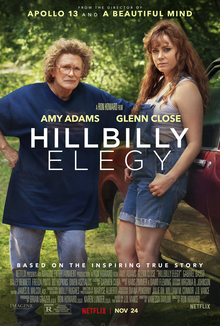|
“Hillbilly Elegy” stars Amy Adams, Glenn Close, Gabriel Basso, Haley Bennett, Freida Pinto, Bo Hopkins, and Owen Asztalos. Released on November 11, 2020, followed by a Netflix release on November 24, 2020, the film chronicles the lives of an Appalachian family. The film is directed by Ron Howard, who also directed films such as “Apollo 13”, “A Beautiful Mind”, “Cinderella Man”, “The Da Vinci Code”, and “In the Heart of the Sea”. It is based on the memoir of the same name by J. D. Vance. The holiday season is a special time of the year when we spend some quality time with our friends and family, especially the latter. So why don’t we spend some time with a family from Appalachia? Ron Howard has been directing a variety of films for many years ranging from comedies to thrillers to even dramas. Some of his films have reached critical gold and became classics. Others, not so much. In terms of box office and critical reception, Howard has been having a difficult time keeping his reputation consistent recently. Throughout the last decade, he has delivered a few misfires like “The Dilemma” and “Inferno”, along with some pretty good films like “Rush” and “Solo: A Star Wars Story”, in my personal opinion. Now he’s starting off the new decade by helming a film adaptation of J. D. Vance’s real-life experience with his family. Ever since its official release a couple of weeks ago, the film hasn’t been doing a lot to redeem Howard’s flawed career as it received some criticism for its story. On the plus side, the cast has earned some praise for their performances, so there’s that. Now that it’s released on Netflix, was it worth the criticism or was it the type of film that’s highly misunderstood? The story’s main focus is J. D. Vance himself (played by Basso), a Yale law student who returns to his family home in Ohio, and his relationship with his mother Bev (Adams) and his grandmother Bonnie “Mamaw” Vance (Close). It also showcases a series of flashbacks that depicts the three generations of the Vance family. In other words, it’s a film that consists of family problems and people having a yelling contest. Typical ingredients for an “awards-worthy” film. But for a film like this to work, it needs to have more than just those elements. It needs to have a compelling story that resonates with people and the topics that we are currently experiencing as we speak. That’s what made “The Trial of the Chicago 7” work for me. In “Hillbilly Elegy”, it deals with poverty and social issues in the Appalachian culture as well as generational trauma and the importance of family and how their teachings can help someone become a better person. Those themes alone could make for an interesting and emotionally-driven story that’ll require multiple tissues, especially the latter two. Unfortunately, that’s not the case. This is one of the films that you’ll either love or hate depending on your expectations. If you’re expecting it to be a straightforward drama about an imperfect family and nothing else, I believe that you’ll be mostly satisfied with the final result. However, if you’re expecting it to be an emotional and well-written roller coaster that focuses on respecting the representation of economic issues in Appalachian culture and its themes, you might not appreciate it as much as the ones that do. Personally, I’m a little bit close to the latter. To Howard’s credit, he did try to make the family drama work by letting the main actors shine and attempting to provide some small doses of emotion into the characters and their relationships. Sadly, he wound up with something that’s somehow more frustrating than sentimental when it comes to the characters and the direction. He had the right idea on the story he wants to envision, but his style of storytelling lacked a lot of things that made the other films with similar themes work extremely well. Some of the editing during a couple of scenes was a bit questionable at times and the emotional depth just felt forced, like it was trying way too hard to make us feel bad for the characters because of the situations that they’re in. Not only was it as mediocre as a made-for-television melodrama on Lifetime, but it’s also unbalanced to a fault. It wants to showcase plenty of emotions, like anger, sad, and happy, but to me, it’s leaning a bit too close to the former, which is something that I really don’t want in a film. This is mostly due to the actions that some of the characters made throughout the film, most particularly Bev. Despite the talent that Adams brought to the table, her character was just way too provocative for me to care about. I can understand that she went through some issues herself, such as drug addiction, but the script didn’t do a whole lot to her character that made me want to feel bad for her. Bev just became one of the mean-spirited characters that made me want to hit with a huge shovel. If there’s one thing that actually made the film worth watching, it would have to be Glenn Close’s performance as Mamaw. While Mamaw is far from a perfect character, Close did a really good job at capturing her strict, yet caring, persona, which could help her get into this year’s Oscar race if she’s lucky. Gabriel Basso also did a suitable job with his role as Vance, and Asztalos wasn’t too bad as Vance’s younger self. Overall, “Hillbilly Elegy” has the ingredients needed to make a compelling and thought-provoking drama. What we got instead is a mediocre experience that force feeds emotions and frustrates me to no end. Even though the cast did their best with their performances, the film suffers from its lackluster storytelling, Howard’s mediocre sense of direction, and some frustrating characters. It’s not as horrible as most of the critics suggested, but I can definitely see this as another misfire from Ron Howard. It’s worth checking out for Glenn Close alone. Other than that, you might be okay skipping this one unless you’re still interested in watching it. C-
1 Comment
|
Home of the most friendly movie reviews on the planet.
Categories
All
Follow Me |
- Home
- Classic Reviews
- 2015 Reviews
- 2016 Reviews
- 2017 Reviews
- 2018 Reviews
- 2019 Reviews
- 2020 Reviews
- 2021 Reviews
- 2022 Reviews
- 2023 Reviews
- 2024 Reviews
- Movie Talk
-
Fan Fictions
-
Ed, Edd n Eddy: The Ultimate Ed-Chronicles
>
-
The 'Beginnings' Saga
>
- Ed, Edd n Eddy: The Rise of Maleficent >
- Transformers: Legend of the Black Cauldron >
- Ed, Edd n Eddy meets the Penguins of Madagascar >
- The Eds and Iron Man: Dawn of the Blowhole >
- Ed, Edd n Eddy: The Fast and the Furious >
- The Eds and Kung Fu Panda: Battle for China >
- Ed, Edd n Eddy and the Lion King: The Full Circle >
- Ed, Edd n Eddy meets Thumbelina: Revenge of the Shredder >
- Ed, Edd n Eddy: Journey to Neverland >
- Ed, Edd n Eddy: All Tangled Up >
- Ed, Edd n Eddy's Frozen Adventure >
- Ed, Edd n Eddy's Edventures in San Fransokyo
- Ed, Edd n Eddy: Return to Neverland
- Ed, Edd n Eddy vs The League of Evil
-
The 'Avengers' Saga
>
- The Eds and the Little Mermaid: Age of Extinction
- Ed, Edd n Eddy meets the Ghostbusters
- Ed, Edd n Eddy: A Sea of Adventure
- Ed, Edd n Eddy meets Anastasia
- Ed, Edd n Eddy in Who Framed Roger Rabbit?
- Ed, Edd n Eddy meets the Incredibles
- Ed, Edd n Eddy and the Lion King 2: Simba's Pride
- Ed, Edd n Eddy: Brand New Zootopia
- Ed, Edd n Eddy: Into the Sugar Rush
- Ed, Edd n Eddy and the Big Sea Quest
- Ed, Edd n Eddy: Heroes Assemble
- Fastformers: Rio Heist
- The Loud Ghostbusters >
-
The 'Beginnings' Saga
>
-
Ed, Edd n Eddy: The Ultimate Ed-Chronicles
>
- Contact
- About


